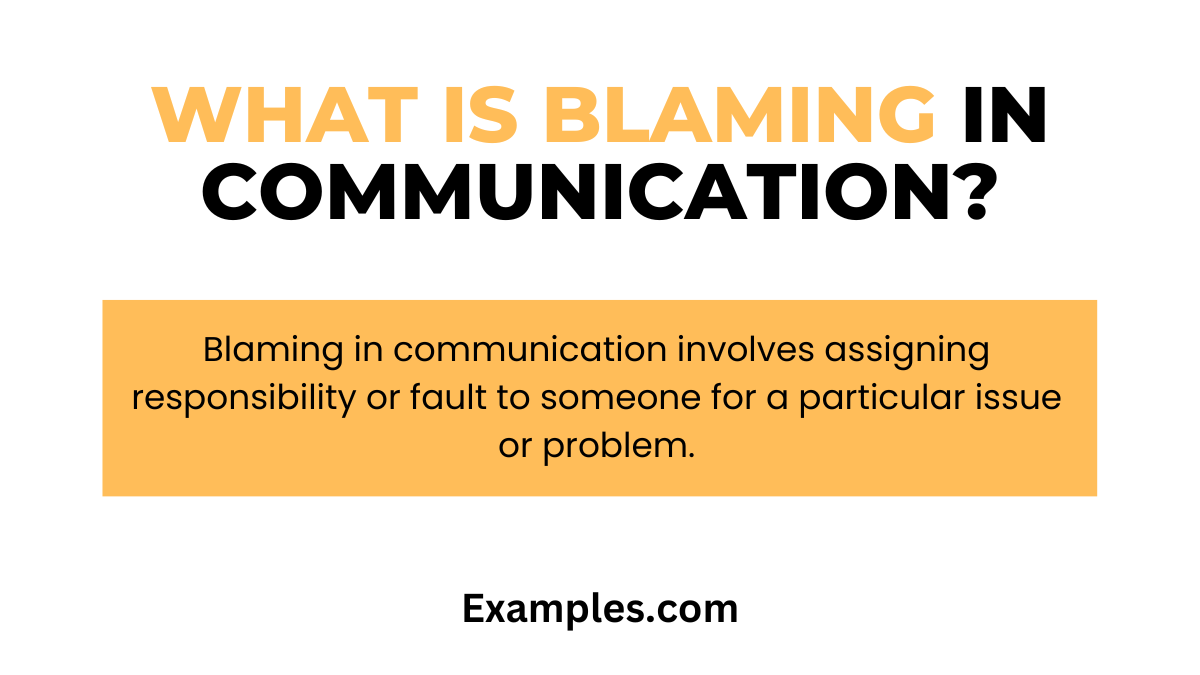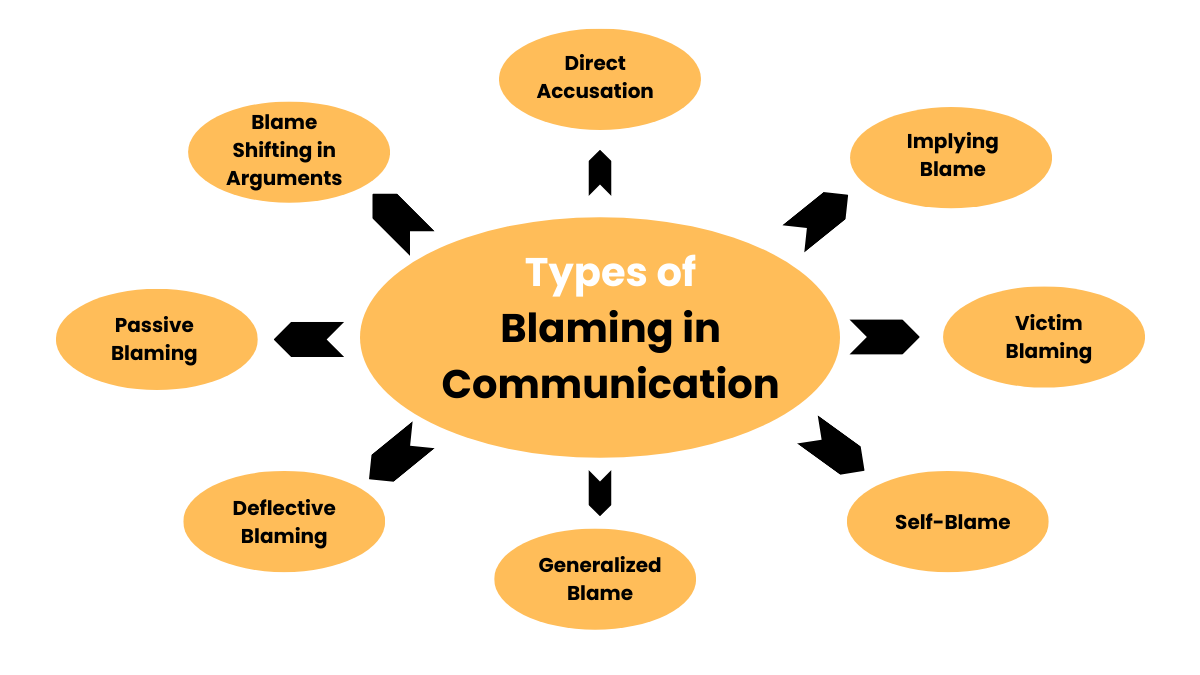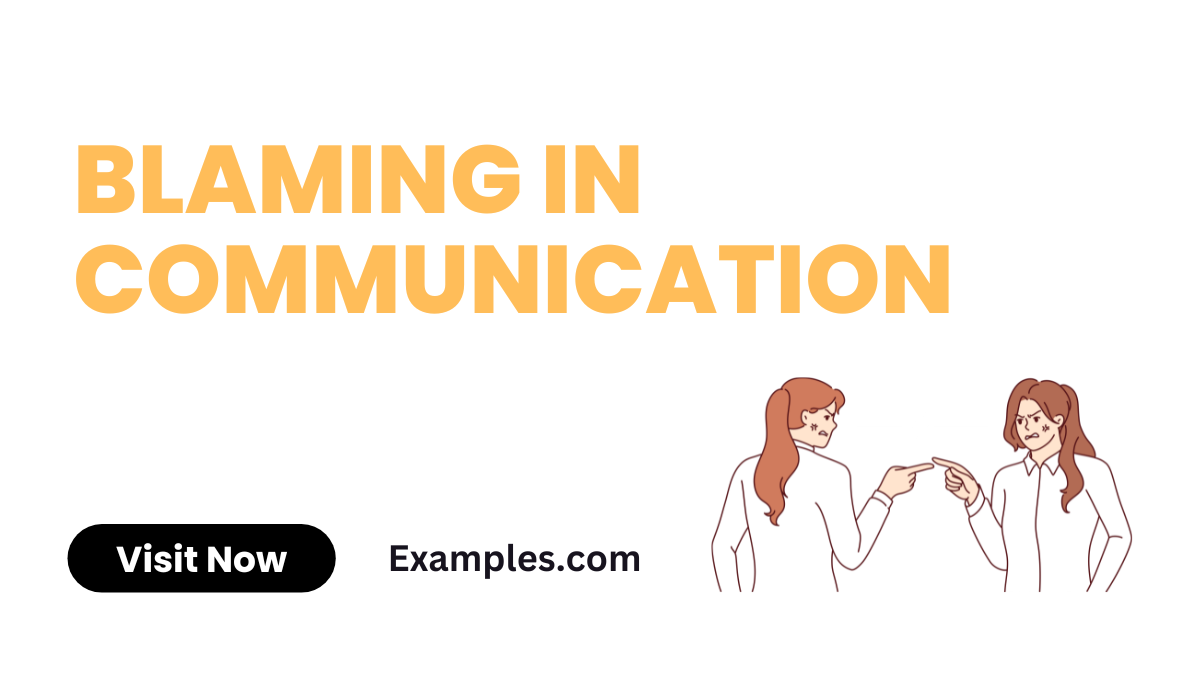19+ Blaming in Communication Examples
“Explore the intricate dynamics of Blaming in Communication with our comprehensive guide. Understand its impact, learn to identify it, and discover effective ways to navigate such situations. This guide is your key to enhancing communication skills, fostering positive interactions, and mitigating conflict by mastering the art of addressing blame constructively.”
What is Blaming in Communication?

Blaming in communication refers to the act of attributing responsibility for a problem or situation to someone else. It often involves negative judgments and can lead to conflict and misunderstanding. Understanding this concept is crucial for healthy interpersonal relationships and effective conflict resolution.
What is the Best Example of Blaming in Communication?

A classic example of blaming in communication is accusing a colleague of causing a project’s failure without considering other factors. This approach can damage relationships and hinder productive dialogue.
20 Examples of Blaming in Communication
Blaming in communication, a form of Aggressive Communication, often leads to negative interactions and conflict escalation. This article delves into 20 vivid examples of blaming in various communication contexts, highlighting its prevalence and impact. Each example, marked in bold, is followed by a brief explanation and example sentences, showcasing how blaming manifests in everyday language. The focus is on understanding the dynamics of blaming within the broader spectrum of aggressive communication, including verbal attacks, accusations, and critical remarks.
- Blaming for Mistakes at Work: Accusing a colleague of causing a problem. “This is all your fault, you ruined the project.”
- Blaming in Relationship Conflicts: Pointing fingers during an argument with a partner. “You always mess things up in our relationship.”
- Parental Blaming: Parents blaming children for their own stress. “I wouldn’t be so stressed if you behaved better.”
- Blaming in Team Failures: Singling out a team member for a group’s failure. “We lost because of your poor performance.”
- Blaming for Personal Inconveniences: Holding someone else responsible for personal challenges. “My day was terrible because of you.”
- Blaming in Traffic Altercations: Accusing another driver during a road incident. “This accident is entirely your fault!”
- Blaming for Miscommunication: Holding someone else responsible for a misunderstanding. “You never understand what I’m saying!”
- Blaming in Customer Service: A customer accusing a representative for a service issue. “You’ve completely messed up my order!”
- Blaming for Lack of Success: Blaming others for not achieving personal goals. “I would have succeeded if it weren’t for you.”
- Blaming in Educational Settings: A student blaming a teacher for poor grades. “I failed because you’re a bad teacher.”
- Blaming for Financial Problems: Holding a partner responsible for financial struggles. “Our financial issues are all because of your spending.”
- Blaming in Healthcare Mismanagement: Patients blaming doctors for unsatisfactory treatment outcomes. “My condition worsened because of your incompetence.”
- Blaming in Sports Team Dynamics: Athletes blaming teammates for a loss. “We lost the game because of your mistake.”
- Blaming for Social Misunderstandings: Accusing friends of causing social discomfort. “You made me look foolish in front of everyone.”
- Blaming in Political Discussions: Politicians blaming opponents for societal issues. “The problems in our city are due to your policies.”
- Blaming for Household Issues: Accusing family members of causing disarray at home. “The house is a mess because of you.”
- Blaming in Professional Misjudgments: Blaming colleagues for poor decision-making. “Your bad judgment led to this disaster.”
- Blaming for Emotional Distress: Holding someone responsible for personal emotional turmoil. “I am unhappy because of what you did.”
- Blaming for Project Delays: Accusing team members of causing project setbacks. “The project is delayed because of your inefficiency.”
- Blaming in Online Interactions: Online users blaming others for spreading misinformation. “You’re the reason for the spread of false information.”
How to Stop Blaming Others in Communication?
- Self-Awareness: Recognize your own role in a situation instead of defaulting to blame.

- Reflect Before Reacting: Take time to think about the situation before responding.
- Empathy: Try to understand the other person’s perspective.
- Use ‘I’ Statements: Communicate your feelings without blaming, e.g., “I feel upset when…”
- Focus on Solutions: Shift the conversation from blame to resolving the issue.
- Avoid Generalizations: Steer clear of statements like “You always…” or “You never…”
- Seek Feedback: Be open to others’ viewpoints about your communication style.
- Practice Mindfulness: Develop a habit of being present and non-judgmental in your interactions.
Types of Blaming in Communication

- Direct Accusation: Explicitly stating that someone is at fault.
- Implying Blame: Suggesting blame through tone or implication rather than direct statements.
- Victim Blaming: Assigning fault to the victim of a situation.
- Self-Blame: Unfairly blaming oneself for situations beyond personal control.
- Generalized Blame: Blaming a group or category of people for individual issues.
- Deflective Blaming: Shifting blame to others to avoid responsibility.
- Passive Blaming: Indirectly blaming someone through passive-aggressive comments.
- Blame Shifting in Arguments: Changing the subject to blame the other person during a disagreement.
What is the Psychological Term for Blaming Others?
- Projection: Attributing one’s own negative traits or responses to others.
- Defensive Attribution: Blaming victims for their misfortunes to feel a sense of control.
- Fundamental Attribution Error: Overestimating personality factors and underestimating situational factors in others’ behaviors.
- Self-Serving Bias: Attributing one’s successes to personal factors and failures to external factors.
- Narcissism: A personality trait leading to excessive blame of others.
- External Locus of Control: Believing that external forces, rather than personal actions, dictate events.
- Victim Mentality: Consistently seeing oneself as the victim and blaming others for one’s problems.
- Scapegoating: Unfairly blaming an individual or group for broader issues.
Recognizing and addressing blaming in communication is crucial for fostering healthy relationships and effective interactions. This article has offered guidance and tips on how to communicate without resorting to blame, promoting understanding and cooperation instead. By practicing blame-free communication, individuals can build trust, resolve conflicts constructively, and create a more positive and harmonious environment in their personal and professional lives.



